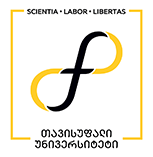Master's in Natural Sciences
24 აპრილი 2018
Programme Title: | Master's in Natural Sciences |
Qualification Awarded: | Master's in Biology; Master's in Chemistry; Master's in Physics. |
Programme Credits: | 120 ECTS |
| Contact Person: | Nutsa Batiashvili n.batiashvili@freeuni.edu.ge |
Language of Instruction: | Georgian |
Concept of the Programme:
Free University Tbilisi (FUT) and Agricultural University of Georgia (AUG) have a vast experience in the development of high quality bachelor's degrees in natural sciences. Many graduates continue to study or work overseas, however, there are also graduates who would like to continue their academic career but can’t afford to go abroad.
There are no educational programs in Georgia that provide adequate access to education to an integrated natural sciences program, namely biology, physics and chemistry. Therefore, the joint educational program in natural sciences is partially designed for such pesons and aims to provide them with a high standard of educational services.
FUT and AUG have unique resources, such as highly qualified professors, material base, financial resources, etc. in the field of natural sciences in order to jointly prepare PhD graduates that will be able to engage in scientific, pedagogical or practical activities.
With joint resources, FUT & AUG can create much better conditions and scientific environment than separately from each other.
While designing this educational program, existing successful models in both United States and in Europe were reviewed and taken into account. Based on these models, we developed a curriculum matching with our goals and potential.
Objectives of the Programme:
The goal of the programme is to prepare Master’s in Biology, Chemistry, and Physics, who will be focused on theoretical, as well as on practical activities. Master’s in Natural Sciences is oriented on developing necessary general skills of students, which are important on one hand for continuing scientific work on doctoral level, and on the other hand for a successful career in the modern labour market.
Career Options:
Upon completion of the Master Programme in Natural Sciences, graduates will be able to work:
- as a scientist or researcher in private and public projects;
- non-governmental organizations;
- as a consultant in a private and public organizations.
Learning Outcomes:
The graduate will have general and specific competencies listed below:
Knowledge and Understanding (Biology):
- will acquire principles and peculiarities of immunological research diverse methods;
- will learn how to use laboratory equipment and reagents;
- will know interaction processes of microbes and host organisms;
- will know technology how to prepare vaccines based on microbes against the infections;
- will be able to characterize cell cultures by microscopy and flow cytometry;
- will know genetic engineering and recombinant DNA technologies;
- will possess knowledge of neuroscience research techniques such as brain electroencephalography, microelectronic technique, psycho-physical methods of research, processing and analysis of brain images obtained by magnetic resonance scanning.
Knowledge and Understanding (Chemistry):
- will have deep and systematic knowledge of chemistry sphere;
- will understand and find out solution ways for any problem;
- will be able to follow the trends of the chemistry field development, understand the challenges of chemistry and chemistry engineering through scientific, scientific-popular or other literature;
- will know how to plan and conduct laboratory, experimental researches.
Knowledge and Understanding (Physics):
- will have a deep and systemic knowledge of the physics field that will allow to understand, make critical analyses and use new original ideas;
- will be able to follow the trends of the physics field development, understand the challenges of chemistry and chemistry engineering through scientific, scientific-popular or other literature.
Applying Knowledge to Practice (Biology):
The graduate will be able to:
- plan the procedures, analyse methods, forecast potential results or unplanned events of biology experiments;
- determine malfunction or reactivity of the equipment during the experiment;
- produce of food raw materials, enzymes, recombinant strains of antibiotics;
- develop experimental design of neurophysiological research and conduct experiments independently.
Applying Knowledge to Practice (Chemistry):
The graduate will be able to:
- use theoretical knowledge in practical tasks of chemistry and related fields;
- design, plan, and divide the work and monitor the progress;
- conduct synthesis of chemical compounds and analyses, to determine the structure and cleanliness of unknown substances by using standard methods.
Applying Knowledge to Practice (Physics):
The graduate will be able to:
- use of modern physics methods to solve the fundamental and applied tasks faced by modern physics and its related fields;
- design, plan, and divide the work and monitor the progress.
Ability to Make Conclusion:
- make grounded conclusions bases on the critical analysis of complex and incomplete information (including recent research);
- make innovative synthesis based on the recent data.
Communication Skills:
- perfect academic writing and communication skill on a native language;
- perfect academic writing and communication skill on a foreign (English) language;
- adapt and act professionally in unfamiliar environment;
- use modern information and communication technologies.
Ability to Learn:
- conduct the learning process independently, to understand characteristics of the learning process and make own strategic plan;
- search/analyse/use of information;
- use the sources in original format and make deep and qualitative critical analysis of the information.
Values:
- Ability to evaluate values and contribute to the establishment of new values. They will have knowledge and understanding of ethical norms while conducting research;
- knowledge of basic principles of professional responsibility and professional ethical norms.




